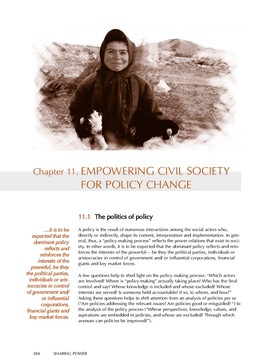Chapter 11. EMPOWERING CIVIL SOCIETY FOR POLICY CHANGE
Document begins: Chapter 11. EMPOWERING CIVIL SOCIETY FOR POLICY CHANGE 11.1 The p politics o of p policy .it iis tto b be A policy is the result of numerous interactions among the social actors who, directly or indirectly, shape its content, interpretation and implementation. In gen- expected tthat tthe eral, thus, a "policy-making process" reflects the power relations that exist in soci- dominant p policy ety. In other words, it is to be expected that the dominant policy reflects and rein- reflects aand forces the interests of the powerful-- be they the political parties, individuals or reinforces tthe aristocracies in control of government and/ or influential corporations, financial interests o of tthe giants and key market forces. powerful, b be tthey the p political p parties, A few questions help to shed light on the policy making process: "Which actors individuals o or aaris- are involved? Where is "policy-making" actually taking place? Who has the final tocracies iin ccontrol control and say? Whose knowledge is included and whose excluded? Whose of ggovernment aand/ interests are served? Is someone held accountable? If so, to whom, and how?" or iinfluential Asking these questions helps to shift attention from an analysis of ...
Cite this publication
Available at https://www.iied.org/g01078
